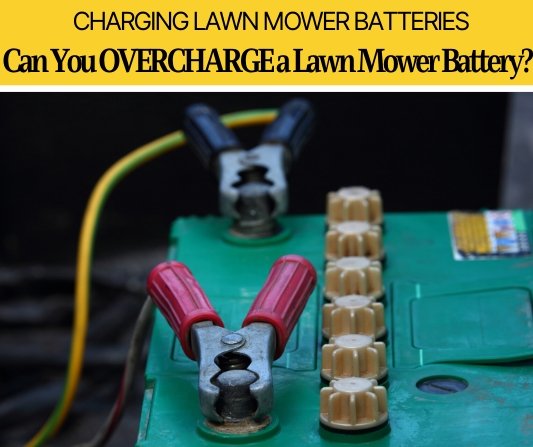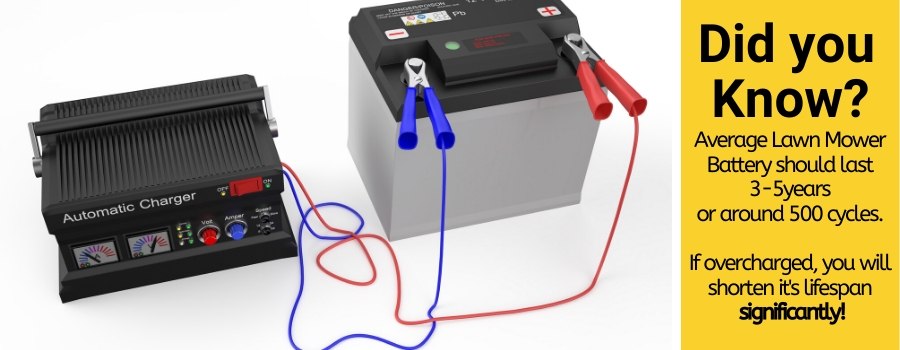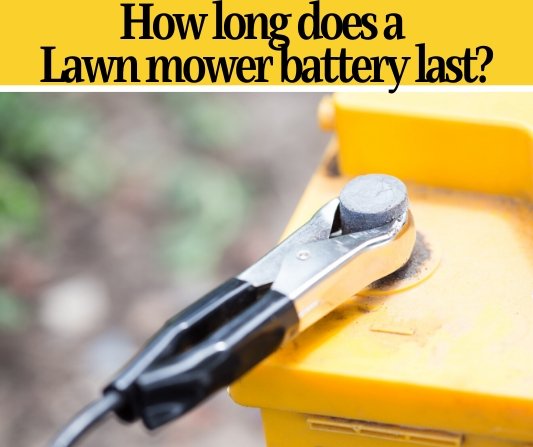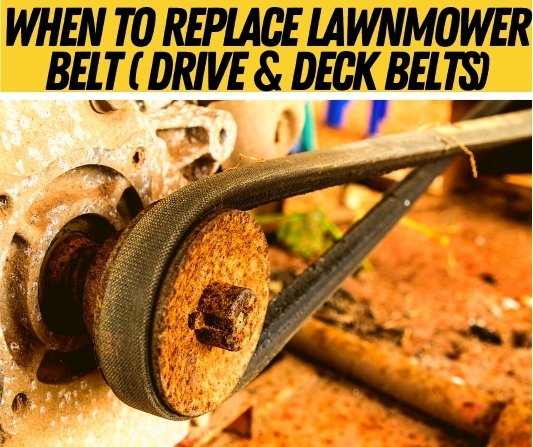 In this article, we’ll cover the dos and don’ts of charging a lawn mower battery,Including the dangers associated with overcharging.
In this article, we’ll cover the dos and don’ts of charging a lawn mower battery,Including the dangers associated with overcharging.
We will also see what are the negative aspects of overcharging a battery,
What to look out for so you don’t overcharge your lawn mower battery, general tips on keeping your mower battery in top shape and see if brand new lawn mower batteries need to be charged.
Can You Overcharge a Lawn Mower Battery?
The simple answer is yes, a lawn mower battery can theoretically be overcharged – but a proper charger will have built-in protection to prevent this, so you shouldn’t have to worry about overcharging it by accident if you have a decent modern charger. If you are planing to overcharge your lawn mower battery on purpose than you must realise that Overcharging will accelerate the natural decay of your battery’s internal components and decrease the life of your battery drastically.
The more complicated answer relies on knowing what “overcharging” actually is and how it happens. It has to do with the fact that your battery and your charger are running at slightly different voltages.
You can think of voltage as how forcefully electricity is being pushed through a wire; if the charger is pushing harder than the battery, the battery charges. Batteries naturally want to discharge any power left in them, so in order to force more charge back in, your charger needs to be at a higher voltage than the battery. A lawn mower battery marked “12 volt” will actually be running at around 11.5 volts when it’s drained, and about 12.5 when it’s full. That means you could charge the battery with just 12.6 volts, but it would take ages. You’re more likely to see chargers running at around 14 volts.
You might already see the problem here: if the battery is full at 12.5 volts, but the charger is running at 14, won’t the charger keep pushing more charge into an already-full battery? That’s when overcharging happens – but don’t worry yet, because chances are either your battery, your charger, or both have some kind of safety system in place to stop this from happening.

Signs of an overcharged lawn mower battery
Most lawn mower batteries are lead-acid batteries similar to car batteries. This kind of battery is filled with fluid that will heat up and expand when it’s overcharged, which can make the battery swell up – so if the sides of your battery are bulging like it’s had too much Christmas dinner, replace it right away. An overcharged battery might also crack open in places and leak fluid. Even if you can’t see this fluid, you might detect it by an acidic smell. This fluid can be dangerous, so wear gloves when cleaning it up and disposing of the battery.
Will an overcharged battery give a slower crank?
What you probably won’t notice from an overcharged battery, at least not right away, is any difference in your lawn mower’s performance. Overcharge will accelerate the natural decay of your battery’s internal components, so you might find your mower doesn’t have as much life in a single charge as it used to. If the overcharge is severe enough, it might cause one of the cells of the battery to burst and stop functioning entirely, which will drop the output of the battery as a whole and prevent your mower from starting.
Read More: How Long Does a Lawn Mower Battery Last
Is it safe to leave a lawn mower battery charging overnight?
At this point, you’re probably realising that the safest thing to do when charging any battery is to disconnect it from the charger as soon as it’s full. That was a good rule of thumb a few decades ago, but as our lives have revolved more and more around battery-powered devices, manufacturers have developed a lot of new safety features that have made it a lot harder for ordinary users to cause any safety issues. If you’re using a properly built charger, there’s little danger from leaving it on overnight.
How to properly charge a lawn mower battery
Good modern battery chargers have something called “overcharge protection”. This means there’s a circuit inside the charger that constantly measures the voltage coming back off the battery, and reduces or cuts off the charge when it’s full. EU and UK regulations have required this kind of protection for years.
The best way to make sure you’re safe from the dangers associated with an overcharged battery is to make sure you buy a charger from a trustworthy source, and that charger is specifically marked as having overcharge protection. Be aware that online marketplaces can sometimes be selling counterfeit chargers missing important safety features, and remember the old adage that if a deal seems too good to be true, it probably is. The Electrical Safety Council recommends a simple 3-point safety check for battery chargers: check that there is at least 9.5mm between the end of the metal pins and the body of the plug; make sure the CE standards mark is present on the charger; and ensure printed instructions and usage warnings are provided in the packaging.
Some newer lawn mowers might be using lithium-ion batteries instead of lead-acid ones. The good news is that these have even more safety features, with extra overcharge protection built right into the batteries themselves. Make sure that you don’t mix chargers, though – a charger intended for a lead-acid battery shouldn’t be used to charge a lithium-ion one, and vice versa.
How long does it take
Broadly speaking, anywhere from 2 to 24 hours, based on its capacity and the charger’s output current.
So far, we’ve mostly talked about voltage. Current, also known as amperage, is the other half of the charging equation. If voltage is how forcefully electricity is being pushed into a battery, current is how much electricity is being pushed. Your charger will have a rating in amps. Your battery’s capacity is rated in amp-hours, which is a measure of current over time.
Some simple math can give you an estimate of the charging time: if you have a 100 amp-hour battery being charged by a 10 amp charger, charging from completely drained to full should take about 10 hours. This isn’t exactly how it works in practice, because charging slows down dramatically as the battery nears full and because batteries are never actually completely empty, but it’s a good way to get a ballpark figure.
How often should I charge my lawn mower battery
As mentioned earlier, extra cycles wear down the internal components and decrease the life of your battery. You should therefore try to avoid charging the battery more often than necessary. The best thing to do is use your mower until the battery is depleted, then pop it on the charger and let it charge until it’s full.
How do you charge a lawn mower battery over the winter
If you’re using a charger with proper overcharge protection, you could use that to keep your lawn mower battery charged over the winter. However, a dedicated “trickle charger” is a more efficient solution that will reduce wear on your battery and make sure it keeps its full charge capacity for longer. A trickle charger runs at a voltage very close to the battery’s – keeping closer to that 12.5 volts mentioned earlier, as opposed to 14. That means it charges very slowly, which is exactly what you want over a long season of disuse.
Can you leave a trickle charger on all winter?
Yes, you can, and in fact it’s better to do so than to let the battery discharge to empty and then charge it back up. In general, batteries should be “cycled” – drained and recharged – as infrequently as possible, as each cycle causes wear that reduces the charge the battery can hold.
Do brand new lawn mower batteries need to be charged before use?
When you take your new electric mower out of the box, the battery will probably have some charge in it, but it’s very unlikely to be full. Strictly speaking, you could use it right away, but it’s better for the long-term health of the battery to fully charge it first. This helps avoid the so-called “memory effect”, where batteries that are drained from a point less than full charge start to resist charging beyond that point. So, if you need an excuse to go relax in the garden and put the mowing off another few hours, science has your back.






